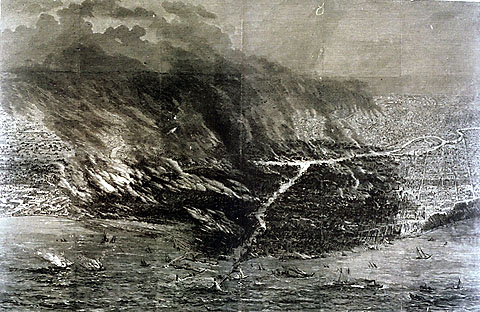
Rescue and Relief
{Main}
Mayor Roswell B. Mason reached his office in the Courthouse about midnight, and for the next two hours he followed the fire's progress, issued commands, and sent telegrams to other cities asking them for additional men and equipment. Forced to flee the burning building, he was now only one more frightened fugitive in the crowded streets, with no alternative others it turned out, his house was spared, though the advancing flames forced him to take a long detour into the North Division before than to try to make it back to his nearby South Division home--if it was still standing. A heading back. Almost three hours later he completed his nightmare journey.On Monday morning, with the city still ablaze, Common Council President Charles C.P. Holden called a combination of elected officials and prominent citizens to a meeting later in the day at the First Congregational Church, out of harm's way in the West Division. They turned the church into a temporary city hall--the first of several makeshift provisions for government services--and arranged to enlist citizens as special deputies, as well as to provide food and water to the burnt-out. Mayor Mason joined the meeting by mid-afternoon, in time to sign a proclamation pledging "the faith and credit of the city of Chicago" to "the preservation of order,...the relief of suffering," and "the protection of property." Other executive orders established the price of bread, banned smoking, limited the hours of saloons, and forbade wagon drivers from charging more than their normal rates.
